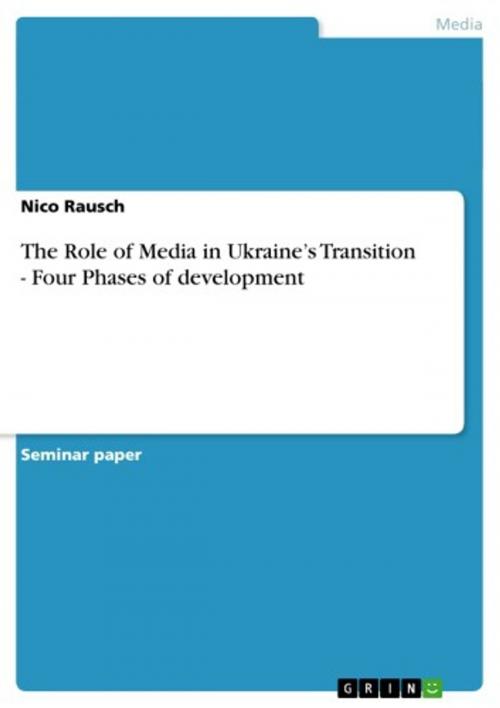The Role of Media in Ukraine's Transition - Four Phases of development
Four Phases of development
Nonfiction, Reference & Language, Language Arts, Communication| Author: | Nico Rausch | ISBN: | 9783640174003 |
| Publisher: | GRIN Publishing | Publication: | September 23, 2008 |
| Imprint: | GRIN Publishing | Language: | English |
| Author: | Nico Rausch |
| ISBN: | 9783640174003 |
| Publisher: | GRIN Publishing |
| Publication: | September 23, 2008 |
| Imprint: | GRIN Publishing |
| Language: | English |
Seminar paper from the year 2007 in the subject Communications - Media and Politics, Politic Communications, grade: 1,3, Vilnius University (Vilnius University), 17 entries in the bibliography, language: English, abstract: This short but fresh analysis of media and its role in democratization will background the following paper about Ukraine's media in democratization. As it will show, all above discussed factors matter in the Ukrainian case. I will give a general overview about the development of media freedom in Ukraine. Therefore I will analyse various different indices: Freedomhouse- Freedom of the Press Freedomhouse- Nations in Transit/ Independent Media Reporters Without Borders (RWB)- Country Ranking IREX- Media Sustainability Index These indices (except NIT) come to the same conclusions even if they use different approaches. Freedomhouse and RWB ratings are empirically quite similar (Becker et al. 2004) but critics about an overall American influence over Freedomhouse lead me to use both of them. There are more media freedom measurements but the above-mentioned correlate in their results and are broad enough to analyse the situation in Ukraine (ibid.). Additionally I will use the reports of these organisations and other scientific literature to explain the major changes. The questions, if media was beneficial for democratic change or not, will be crucial as well as if media does have affects (every time). I will describe the regime change (Orange Revolution) with the major focus on the media. Was it supportive or not? Did the media lead or follow? I will describe the major outcomes for the media after the Orange Revolution and the future prospects on its role for democratization. [...]
Seminar paper from the year 2007 in the subject Communications - Media and Politics, Politic Communications, grade: 1,3, Vilnius University (Vilnius University), 17 entries in the bibliography, language: English, abstract: This short but fresh analysis of media and its role in democratization will background the following paper about Ukraine's media in democratization. As it will show, all above discussed factors matter in the Ukrainian case. I will give a general overview about the development of media freedom in Ukraine. Therefore I will analyse various different indices: Freedomhouse- Freedom of the Press Freedomhouse- Nations in Transit/ Independent Media Reporters Without Borders (RWB)- Country Ranking IREX- Media Sustainability Index These indices (except NIT) come to the same conclusions even if they use different approaches. Freedomhouse and RWB ratings are empirically quite similar (Becker et al. 2004) but critics about an overall American influence over Freedomhouse lead me to use both of them. There are more media freedom measurements but the above-mentioned correlate in their results and are broad enough to analyse the situation in Ukraine (ibid.). Additionally I will use the reports of these organisations and other scientific literature to explain the major changes. The questions, if media was beneficial for democratic change or not, will be crucial as well as if media does have affects (every time). I will describe the regime change (Orange Revolution) with the major focus on the media. Was it supportive or not? Did the media lead or follow? I will describe the major outcomes for the media after the Orange Revolution and the future prospects on its role for democratization. [...]















